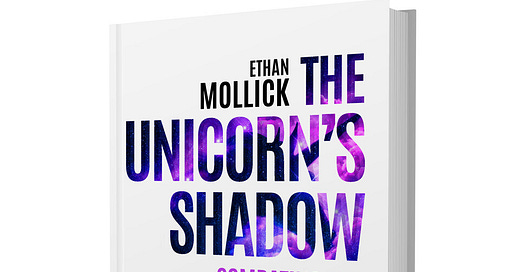Debunking startup myths and founders' misconceptions
Artificial intelligence scholar Ethan Mollick challenges the startup narrative and offers actionable advice for founders.
The Unicorn's Shadow: Combating the Dangerous Myths that Hold Back Startups, Founders, and Investors
By Ethan Mollick
While waiting for Ethan Mollick’s new book—Co-Intelligence: Living and Working with AI—to arrive, I read his earlier work, The Unicorn’s Shadow; I’m glad to have done so. The book dispels many of the myths thrown around about starting successful businesses. For example, we’re led to believe that most successful startups are conceived by folks in their 20s and 30s—think Facebook’s Zuckerberg (19), Snap’s Evan Spiegel (25), etc. The research cited by Mollick, a scholar on AI and entrepreneurship at the The Wharton School of the University of Pennsylvania, tells a different story.
The average age of startup founders is 42; the average age for fast-growth startup founders is 45-49. However, many successful businesses were started by founders in their 50s, including Huffpost, which was started by Arianna Huffington at age 55.
In fact, Mollick reveals that older founders tend to fare better than younger ones, largely due to their experience, networks, and greater understanding of their industries. This is a valuable insight for professionals looking to start businesses later in life.
I love books that blow holes in conventional thinking; the Unicorn’s Shadow impressed with me the amount of research and data the author used to make his arguments. In fact, I filled up many notebook pages trying to grab the many nuggets of wisdom he was dropping.
A few of my favorites include the following:
Overconfidence can be an albatross for founders.
Mollick says that startups as a whole are dominated by overconfident founders. But, he writes, what they offer in the way of innovation and creativity is often overshadowed by their blindness to the true challenges of running a business. Their unrealistic expectations can be a recipe for failure.
Innovation ≠ hours worked.
He punctures the hustle culture myth that’s prevalent in Silicon Valley, where you’ll often hear folks bragging about working 100-hour weeks. Mollick cites studies showing that creativity and innovation often thrive when founders have time to rest and reflect.
Give bootstrapping a long, hard look.
While everyone brags about getting time with VC’s in hopes of garnering funding, Mollick shows that many businesses have better outcomes by bootstrapping, relying on angel investors and friends and family to get things off the ground. He says the pressures of giving up a focus on a business’s long-term health to prioritize short-term goals can be deleterious.
Don’t overlook going into business with a friend—under certain conditions.
He says that starting a business with a friend is OK, provided you’ve worked with or collaborated with them in the past. Where things go awry, he says, is when you don’t know the person's work habits and/or your work styles clash. At a minimum, he writes, you should have successfully collaborated in a professional setting together before hanging out a shingle together.
Equal equity splits are a disaster waiting to happen.
I wish I would have known this a decade ago. Mollick says equal equity splits fail to account for the differences in contribution, risk, and responsibility for each member, which can lead to hard feelings and fissures. His recommendation is that startup founders divide the equity based on each partner’s role, initial investment, and future contributions. (I cannot stress enough that this section alone makes Unicorn’s Shadow worth reading.)
“Sixty-five percent of the reason startups fail is because of issues with the senior management team.”
Understand effectual reasoning.
He cites the example of the Oculus Rift to illustrate effectual reasoning, where entrepreneurs focus on using available resources rather than setting fixed goals. California teenager Palmer Luckey, Oculus Rift's founder, didn’t start with a grand business plan but instead experimented with VR technology as a hobby in his parent’s garage.
By leveraging his skills and resources, and adapting to new opportunities, like the viral Kickstarter campaign, Luckey's project grew into a multi-billion-dollar company. (It was sold to Facebook for $2B in 2014.) Mollick says this nimble approach, focusing on what you can do with what you have, often leads to innovation and success.
“Embrace the idea that only you can implement right now.”
Who should read the book
I highly recommend Unicorn’s Shadow for aspiring entrepreneurs. It’ll open your eyes to unforeseen pitfalls and help you better navigate some of the most vexing startup challenges, especially those related to partnerships, funding, and hiring. Even better for folks who are not big readers, the book is only 116 pages.




